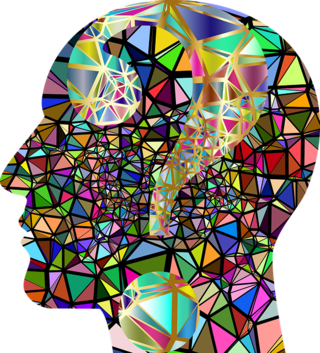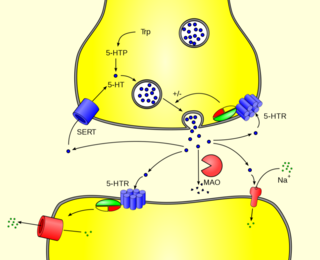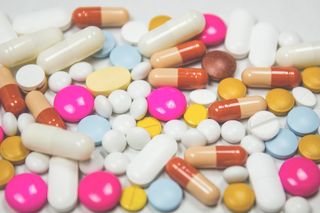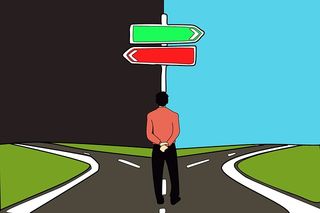Depression
Do You Need Drugs for Your "Chemical Imbalance"?
Research challenges widely held assumptions about depression and medication.
Posted June 22, 2017

Naturally we were curious when Dave was out of school for many days. It was 1991 and I was a high school student in a small Indiana town. When he returned after a month's absence, he told us he had a "chemical imbalance" and had been given medication to fix it.
It was the first time I had heard of a chemical imbalance. Although I had no idea what it meant, I came to accept it as the driving force behind depression, bipolar disorder, and other psychiatric conditions. I assumed, along with countless others, that medication was needed to fix this imbalance.
About a decade later I started my doctoral studies and began digging into the research on depression vulnerability. I wanted to understand what makes some people prone to getting depressed, while others seem to be protected.
I first studied external factors that lead to depression. Not surprisingly I found that upsetting life events—the death of a loved one, loss of a job, or divorce, for example—were linked to subsequent depression.
Next I examined psychological risk factors and found that the best predictor of developing depression was personality, specifically neuroticism. This finding was not surprising either, given that neuroticism is defined as the tendency to experience negative emotional states.
While both life events and neuroticism were significant predictors, the size of their effect was modest. I'd been looking forward to diving into biological factors, where I assumed the "real action" was. I expected to find big effects of the specific chemical imbalances that lead to depression.
Instead, what I found shocked me (and surprised more than one of my doctoral committee members): There was no good evidence that depression is caused by low levels of neurotransmitters like serotonin.
So why had this belief become so accepted? The primary evidence that depression was caused by low serotonin (and perhaps other neurotransmitters like norepinephrine) came from an inference—since effective medication tends to increase the availability of these chemicals, their levels must have been low. This hypothesis was not unreasonable, but evidence to support it was sorely lacking.

What About Medication for This Nonexistent "Imbalance"?
If the data don't support the chemical imbalance hypothesis, what are the implications for the use of medications like selective serotonin uptake inhibitors (SSRIs) for depression?
Around the time I was reviewing the research on depression vulnerability, the general consensus was that "real depression" required "real treatment"—in other words, medication. But as I've written elsewhere, clinical trials found that cognitive behavioral therapy (CBT) was just as effective in the short term, and more effective in the long term.
And then came a publication in 2010 that shook psychiatry: A review published in the Journal of the American Medical Association showed that on average, medication for depression was no more effective than placebo, except for the small subset of people with very severe depression. (Full disclosure: the first and second authors are people I know from my time at the University of Pennsylvania.)
The implication was staggering: Most people who take medication for depression would do just as well on a placebo, given that only 13 percent of people with depression are classified as "very severe."
Predictably there were many criticisms of this study. How could there not be when it called into question the use of medication that about 1 in 8 Americans were currently taking?
One of the main criticisms was that the review included only six studies. Perhaps those studies were not representative of all the trials that have been done. Would a larger study reveal greater effectiveness of medication across depression severity?
More recently a group of researchers pulled together 34 depression treatment trials. It's reasonable to expect that this set of studies would not be biased against medication, since all trials were owned or sponsored by pharmaceutical companies.
In contrast to the 2010 report, this larger study found no difference in medication's efficacy as a function of depression severity. However, the authors and some who applauded the vindication of medication for depression ignored a crucial piece of the puzzle: Medication wasn't much better than placebo, for any severity level.
Both groups' depression scores started at 23; the average drop for the placebo group was about 9 points. And for the medication group? An 11-point reduction—a mere 2-point advantage for a drug that supposedly corrects neurotransmitter levels.

So the punchline from this rebuttal to the 2010 study was the opposite of what has been claimed: Rather than showing that medication is a powerful treatment for all levels of depression, it showed that medication barely beats placebo, even for those with severe depression. Whereas the 2010 study suggested that only those with very severe depression would do better on medication than placebo, this larger study calls into question the utility of medication for any level of severity.
Is Medication for Depression Useless?
I've heard many reactions to the 2010 study, most of which fall into two opposing camps:
- Many people infer that the medication isn't doing anything for people with mild to severe depression, and so doctors should stop prescribing depression medication to all but the very severely depressed.
- On the other side, some argue that these results can't be valid because they have personally experienced or witnessed the tremendous—even life-saving—benefits of medication for depression.
These two positions actually share some interesting common ground, in that both imply that placebo does nothing to relieve depression.
But that's not at all what the studies show. Instead they highlight how powerful placebo is—so much so that the best active medications barely do better.
The 9-point reduction in symptoms that the average person on placebo enjoyed is a big deal—a nearly 40 percent improvement. So while the mean score before treatment fell at the boundary between moderate and severe depression, placebo treatment brought the mean well into the mild range.
Medication yielded a 48 percent improvement and similarly moved the mean from the moderate-to-severe range into the middle of the mild range.
Taking a placebo is very different from receiving no treatment, which typically leads to less improvement (about 12 percent, according to a review). People with depression that's not severe or chronic have other good options for treatment, as I've written previously (What Is the Best Way to Treat Depression?).
As for those who have personally seen the positive effects of medication, those effects are real—it's just not clear what's causing them. They could be due to the drug's action on serotonin reuptake, or to the multiple factors that might account for the placebo response: the expectancy of improvement, having a positive relationship with a caring clinician, a positive feeling from taking active steps to address the depression, and others.

In the end, the decision about medication is a highly personal one. Some individuals don't care if their improvement is actually due to the active ingredients in the medication, as long as they feel better. Others choose to avoid a medication that's likely no better than placebo.
What's most important is that we're able to make educated choices based on the most up-to-date information. The strongest evidence suggests that in the majority of cases, commonly prescribed medications for depression are about as effective as placebo—which is actually pretty good.
-
Looking for self-directed cognitive behavioral therapy for anxiety or depression? CBT in 7 Weeks is available in paperback and Kindle.
-
Sign up for the Think Act Be newsletter to receive updates on future posts.
References
Fournier, J. C., DeRubeis, R. J., Hollon, S. D., Dimidjian, S., Amsterdam, J. D., Shelton, R. C., & Fawcett, J. (2010). Antidepressant drug effects and depression severity: A patient-level meta-analysis. JAMA, 303, 47-53.
Kantor, E. D., Rehm, C. D., Haas, J. S., Chan, A. T., & Giovannucci, E. L. (2015). Trends in prescription drug use among adults in the United States from 1999-2012. JAMA, 314, 1818-1830. doi:10.1001/jama.2015.13766
Kessler, R. C., Berglund, P., Demler, O., Jin, R., Koretz, D., Merikangas, K. R., ... & Wang, P. S. (2003). The epidemiology of major depressive disorder: Results from the National Comorbidity Survey Replication (NCS-R). JAMA, 289, 3095-3105.
Posternak, M. A., & Miller, I. (2001). Untreated short-term course of major depression: A meta-analysis of outcomes from studies using wait-list control groups. Journal of Affective Disorders, 66, 139-146.
Rabinowitz, J., Werbeloff, N., Mandel, F. S., Menard, F., Marangell, L., & Kapur, S. (2016). Initial depression severity and response to antidepressants v. placebo: Patient-level data analysis from 34 randomised controlled trials. British Journal of Psychiatry, 209, 427-428.
Zimmerman, M., Martinez, J. H., Young, D., Chelminski, I., & Dalrymple, K. (2013). Severity classification on the Hamilton Depression Rating Scale. Journal of Affective Disorders, 150, 384-388.




